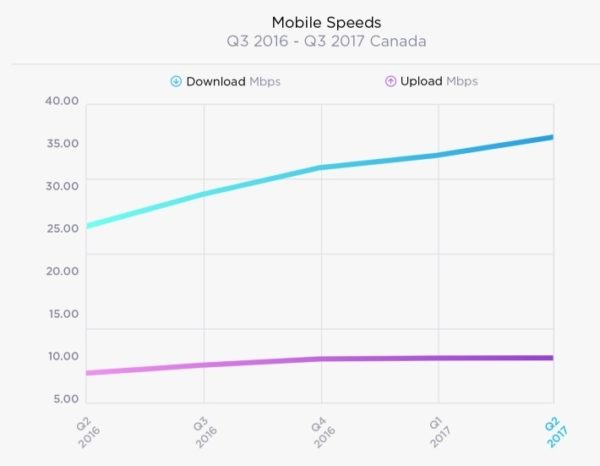
 Even if Canadians are unhappy with the monthly hit of their mobile phone bill, they should be more content with their uploading and downloading speeds, which have increased significantly over just the past year.
Even if Canadians are unhappy with the monthly hit of their mobile phone bill, they should be more content with their uploading and downloading speeds, which have increased significantly over just the past year.
According to Internet metrics company Ookla, Canada’s mobile download speeds ranks 15th worldwide at an average rate of 35.19 Mbps over the past six months of 2017. That’s enough to place Canada third in North America after Mexico and the Bahamas and marks a 38.9 per cent improvement over the same time last year.
Upload speeds were less rosy, putting Canada 46th worldwide at an average of 10.29 Mbps, which is still a 19.8 per cent increase on last year.
“Canadian mobile carriers are the force behind these continent-topping speeds,” reads the annual Speedtest Canada Report. “Rogers Wireless was the first Canadian carrier to launch LTE back in 2011, introducing mobile broadband experience to Canadians. Bell Mobility and TELUS followed with an interesting, but effective, strategy of sharing both spectrum and infrastructure.”
Telus proved to be Canada’s fastest carrier, followed in order by Bell Mobility, Videotron, Fido and Rogers Wireless. Across the country, Telus was the top carrier in five cities and Bell Mobility in four.
The report is based on almost twenty million consumer-initiated tests during the second and third quarters of 2017. In an intra-city comparison, the report found that Halifax residents had the fastest average download speed at 45.88 Mbps, followed by Vancouver at 41.33 Mbps. The slowest of the ten cities measured turned out to be the nation’s capital, Ottawa, with an average of 30.63 Mbps.
For fixed broadband, Canada ranks 19th internationally and second in North America with an average download speed of 59.67 Mbps, based on 17 million tests across almost four million unique users.
Ookla’s cross-country ranking of broadband providers has Rogers with the fastest service, followed by Shaw, Bell Canada and Telus. “Rogers sticks out in Canada’s crowded fixed broadband market,” says the report.
But as far as coverage goes, there’s a disparity across the country, with some regions being better served than others. “Nearly all providers show a relatively strong presence on the south-east end of the country, which presents Toronto and surrounding areas with a surplus of choice when it comes to service options,” says the report. “The cities further west, however, are less fortunate. Canada’s south-west region is served by about half of the seven providers leaving Vancouver, Edmonton, and Calgary with fewer choices.”
And although you may grumble about the cost of Internet and mobile service, Canadians don’t really have it so bad, at least according to a report by the Economist which aims to measure Internet inclusivity. That ranking has Canada in eighth place worldwide, thanks to a high affordability score, itself attributed to the country’s “very competitive” environment for both wireless and broadband service.
“There is more to inclusion that Internet availability,” says the report. “Most of the world’s leaders in building connectivity are also strong in supporting other enablers of Internet inclusion, namely Affordability, Relevance and Readiness.”
Leave a Reply
You must be logged in to post a comment.




 Share
Share Tweet
Tweet Share
Share




Comment